
Safety First!
Natural gas is a very important energy source. Explore this section to learn why we should, “Think Safety First!”
Let’s Be Sense-able!
 Natural gas is an important fuel that’s used to do all kinds of things from heating homes to drying paint on new cars, from lighting up city streets to firing up barbecue grills.
Natural gas is an important fuel that’s used to do all kinds of things from heating homes to drying paint on new cars, from lighting up city streets to firing up barbecue grills.
What is natural gas, anyway? Natural gas is an energy resource that comes from underground. Gases are a type of matter; the other types of matter are solids and liquids. There are lots of gases, but the most important one in Energy Underground is natural gas!
Natural gas has no real form of its own. It fills out whatever container holds it. It has no color or smell. Gas is delivered to your home or school in a pipe. As a measure of safety, your gas company adds a special smell to the gas that makes detecting leaks fast and easy. The gas is given a smell like really rotten eggs – ugh!
If you ever get a whiff, you won’t soon forget it! This strong smell could mean something simple such as a pilot light that needs to be relit. In any case, leave the area and call an adult to help you track down the source of the odor to make sure all is safe.
Learn to be a Safe Cook
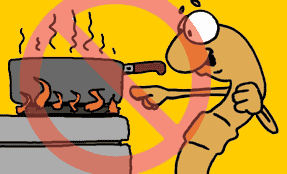 Natural gas fuels many appliances in your home, such as a water heater or a clothes dryer. In this section of Energy Underground, we’re interested in how natural gas helps us to COOK! Do you know how to be a safe cook? Here’s how:
Natural gas fuels many appliances in your home, such as a water heater or a clothes dryer. In this section of Energy Underground, we’re interested in how natural gas helps us to COOK! Do you know how to be a safe cook? Here’s how:
Stoves and ovens are not toys; treat them with respect. Good cooks keep younger brothers and sisters from playing with knobs or controls. Remember: a good cook is a safe cook!
 A good cook reminds the adults in the household that the flames on the burners on the stove should burn “true and blue.” Flames of any other colors, like orange or yellow, mean the stove is not working properly.
A good cook reminds the adults in the household that the flames on the burners on the stove should burn “true and blue.” Flames of any other colors, like orange or yellow, mean the stove is not working properly.
Orange or yellow flames can indicate that the stove is producing carbon monoxide. Carbon monoxide is a poisonous gas that is colorless and odorless. If your stove is not burning “true and blue,” have a qualified technician check it out for your family.
 A good cook reminds others in the household that ovens and stoves are not made to be room- or people-warmers on cold days. Leaving ovens on and the doors open in order to warm a room or dry wet boots or sneakers could cause unsafe levels of carbon monoxide.
A good cook reminds others in the household that ovens and stoves are not made to be room- or people-warmers on cold days. Leaving ovens on and the doors open in order to warm a room or dry wet boots or sneakers could cause unsafe levels of carbon monoxide.
More Ways To Be A Safe Cook!
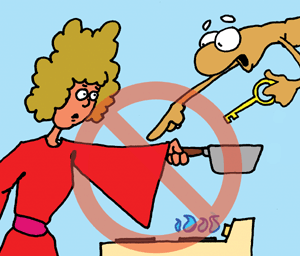 Don’t wear loose clothing while cooking over a flame. Also, be careful with cloth towels and potholders or any other flammable materials near a flame.
Don’t wear loose clothing while cooking over a flame. Also, be careful with cloth towels and potholders or any other flammable materials near a flame.
On any stove, turn the pot handles away from the edge of the stove to prevent spilling.
Never turn a stove up so that the flame comes up around the side of the pot. This not only can cause burns, it is also a waste of energy and can damage the pot.
Stay Out of Hot Water!
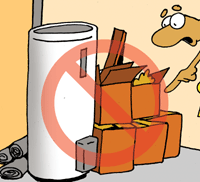
The water heater is a common source of hazards. Practice the safety rules below to prevent fires and other accidents with your water heater.
Keep the area clear around natural gas water heaters, clothes dryers and furnaces. Don’t pile boxes, papers or clothes around the water heater.
Don’t hang anything on the natural gas pipes leading to the water heater or natural gas appliances. Also, don’t climb, hang or lean on the pipes.
Never store flammable materials including gasoline, paint thinner, paints or kerosene in the same room as a natural gas appliance. This is especially important around the natural gas water heater.
Remember:
No flammables near your water heater!
Be Safe with Gas Logs!
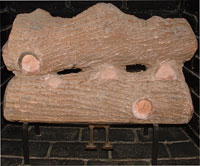 It is very important to be safe around gas logs. Practice this list of safety rules:
It is very important to be safe around gas logs. Practice this list of safety rules:
1. Children should never light gas logs.
2. Never play with the valves that turn the gas on and off.
3. Remind adults to remove the key to the gas valve and store it in a safe place.
4. Remind adults to open the flue before striking a match and turning on the gas.
5. When gas logs are on, do not sit close to the flames.
6. Don’t wear loose clothing such as coats and scarves around gas logs.
7. Never place flammable materials including newspapers or clothing close to the gas logs when they are lit.
8. Don’t place damp clothes close to gas logs to dry. Keep them at least five feet away.
Outdoor Safety
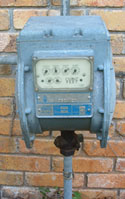 Follow these outdoor safety tips:
Follow these outdoor safety tips:
• Remind your parents to call 811, the national one call number, before you dig. They’ll send someone out to mark the underground utility lines to make sure that there are no natural gas pipes in your work area. The lines must be marked even for small projects such as planting a tree, building a fence or installing a mailbox on a post.
• Don’t play, climb on or dig around the natural gas meter.
• Never pile dirt or snow on your natural gas meter.
• Children should never attempt to light outdoor gas grills.
Pipeline Safety
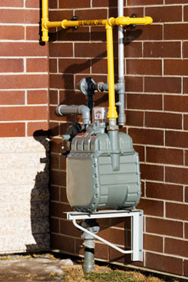 There may be an underground natural gas leak if you see one or more of these warning signs:
There may be an underground natural gas leak if you see one or more of these warning signs:
• You smell natural gas outside. It will smell like rotten eggs.
• You hear a hissing sound coming from the ground.
• You see dirt blowing from a hole in the ground.
• You see a water puddle bubbling.
• You see a ring of dead grass.
If you notice one of more of these signs, there could be a natural gas leak. In case of a natural gas leak, you should:
Leave the area right away and call the gas utility, fire department or other emergency agency to report the leak.
Stay away from the area and keep others away until someone from the gas utility, fire department or other emergency agency says it’s safe to return.
If the gas leak is near a building that uses natural gas, leave the building right away and call the gas company, fire department or other emergency agency to report the leak. Do not use a phone or cell phone in the building where you suspect a gas leak. Do not light a match or turn any light switches on OR off. Do not turn any appliances on OR off.
